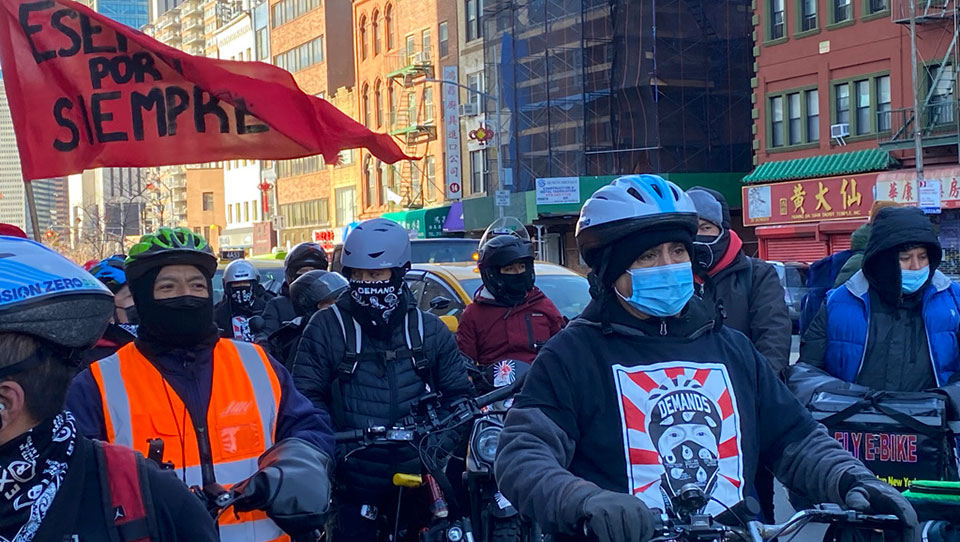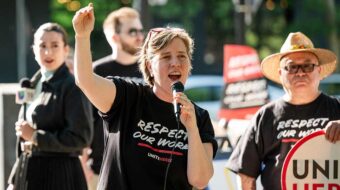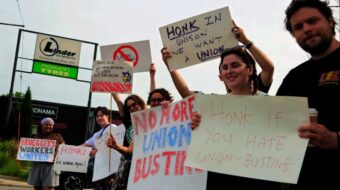
NEW YORK—Biking in the rain, Jose “Manny” Ramirez dodges cars and pedestrians on the busy streets of Manhattan. He rushes from McDonald’s to an elderly couple, from the South Bronx to the Upper East Side, and then back again. He uses his smartphone to accept orders and deliver everything from food to groceries to toiletries. He finally arrives at a new, 12-story tall glass apartment building, and the elevator is out-of-service.
On the next order, the delivery app tells him to travel down West 169th Street, but he finds that it is closed for repaving. Later, a customer complains to him that their order for two hamburgers only contained one, something that is no fault of Manny’s. On his last order of the day, he must take an order from the Bronx to Washington Heights, Manhattan, biking all the way over the Harlem River.
When he is late, Manny risks a low rating from the customers. That jeopardizes his ability to accept the delivery orders with large tips. Rain or shine, road closures or holidays, the rhythm of his work is defined by an algorithm. The algorithm uses data on supply and demand to calculate where he will go and what is the most efficient use of his time. Manny and his coworkers refer to this algorithm as their jefe fantasma, or ghost boss.
This ghost boss can “deactivate” Manny at any time, without an explanation, removing him from the app and pushing him into unemployment. Being managed almost entirely by a non-human entity, this level of precarity is a dramatic new development in employer-employee relations.
Technology is rapidly altering the labor organizing landscape, changing workers’ relationships to one another and the bosses. The new ways technology is configuring our workplaces play a major role in conversations about the future of labor organizing. Because traditional unions have lost strength over the last few decades, strategies that focus on the social movement aspects of a labor campaign connect workers with one another as large segments of the workforce are automated, pushed online, and subjected to opaque algorithmic management.
When considering the consequences of these trends for organizing, it is impossible not to think about the rise of app-based gig work and its repercussions on organizing across all industries. An up-and-coming gig worker organization in New York City called Los Deliveristas Unidos is leading the way in organizing this industry, showing the labor movement the ways to meet this new group of workers where they are.
Nowhere is this more needed than in the growing app-based gig economy. Amid a decades-long decline in unionization rates, the rise of the gig economy has initially hindered labor organizing in the United States. Many scholars and activists are concerned about what the future of the labor movement will look like in an economy that relies more on a contractor model of employment, but some are hopeful that this is an opportunity to revitalize our movement.
‘App Capitalism’ vs 55 million gig workers
According to the International Labour Organization, there were 55 million gig workers in the United States in 2017. That is around a third of the American workforce. The pandemic displaced workers into the gig economy as service and retail workers were laid off; many of them transitioned into working for delivery services like Uber Eats and Grub hub.
The shift to algorithmic management, the uniqueness of the urban environment as an organizing space, and the diversity of this industry demand that labor organizers experiment with new organizing strategies and institutional models. App-based gig workers in New York City are on the forefront of the conversation about what shape these new organizing models will take. Although social movement unionizing strategies and horizontal, participatory union structures are not novel, the unique circumstances that the deliveristas find themselves in offer a newly-energetic labor movement important insights into organizing in an industry dominated by surveillance, data collection, algorithms, and exploitation. Some scholars have characterized this burgeoning industry as “App Capitalism.” This is a new frontier in labor organizing.
New York City’s 65,000 app-based delivery workers were praised as essential workers in the early stages of the pandemic, but they are still fighting for living wages, more control over their work, and safer working conditions. The lives of these workers, who are mostly immigrants from Mexico, Guatemala, China, Bangladesh, Haiti, and West Africa and speak limited English, are among the most precarious in the city. Just last year, more than 15 delivery workers were killed in traffic accidents or during robberies. Many more have reported being injured on the job and having their equipment stolen.
Deliveristas use WhatsApp to organize themselves
As they suffered on the frontlines of the pandemic, the deliveristas began to organize themselves through WhatsApp groups. They eventually came together to partner with Worker’s Justice Project to form Los Deliveristas Unidos (LDU), now one of the most powerful app-based workers organizations in the country. The structure of the organization relies on the deliveristas themselves to act as organizers, monitoring their group chats and building associational networks throughout the deliverista community in their neighborhoods.
Since the deliveristas work alone and are typically made to compete with one another for deliveries, organizers face a unique challenge bringing the deliverista community together. When talking about the difficulty in building relationships between coworkers, Manny says that “you can work one full month without talking at all with another worker.” To overcome these challenges, LDU has had to be flexible in its organizing campaign.
Deliveristas have no physical workplace: their work is defined by their mobility in the urban landscape. To maximize profits, the apps distribute deliveristas spatially throughout the city. Using a complex algorithm, they create points outside of high-demand restaurants where deliveristas find themselves waiting for the next rush. These natural nodes in the web of delivery workers throughout the city allow the deliveristas to build community and connect with one another, with many starting group chats. Organizers at LDU have embraced mobility in response to these conditions, setting up small events throughout the city to target nodes in different neighborhoods.
The diversity found within the deliverista community is simultaneously a challenge and advantage for LDU’s organizers. The various languages that deliveristas speak present some barriers to LDU, but the common experience of being a delivery worker and immigrant in New York City has brought these workers together despite their differences. Many local immigrant advocacy groups have formed partnerships with the deliveristas to share resources and knowledge of the local political scene.
One of the most valuable partnerships LDU has established is with the Queens-based organization Desis Rising Up and Moving (DRUM). This alliance has brought the mostly Hispanic membership of LDU together with the Bangladeshi workers who are a part of DRUM, and they present a united front against exploitation from the apps. Over the past several months, LDU has begun to establish inroads in the Haitian, Chinese, Bangladeshi, and West African deliverista communities, strengthening its coalition and fueling its growth.
Many deliveristas are undocumented and skeptical of utilizing city services, including emergency services, out of fear of retaliation over their immigration status. This also makes these workers more susceptible to exploitation from the apps themselves as well as from schemes to sell them uncertified, faulty equipment.
Focusing on mutual aid
LDU’s strategic power comes from focusing on mutual aid as a method to build community. The organization puts time and effort into helping the undocumented community navigate the apps, set up bank accounts, pay taxes, and complete paperwork. LDU also sometimes serves as the community’s link to emergency services, connecting deliveristas to the police and legal aid in cases of robbery or accidents.
The unique circumstances of the app-based delivery industry in New York City are perfect for a creative organizing strategy that emphasizes worker participation, flexibility, and mutual aid. LDU has become a force to be reckoned with in New York City’s politics. As the organization continues to diversify its coalition, it will be able to push for legislation at the state level that establishes a framework for how app-based workers can form legal unions. The organization’s willingness to take risks and adapt to the ways that algorithms shape this unique industry has been key to its success. As technology continues to rewrite our workplace norms, labor organizers in every sector should anticipate the ways their industry will change and learn from LDU’s reliance on flexible, mobile, service-first organizing.












Comments